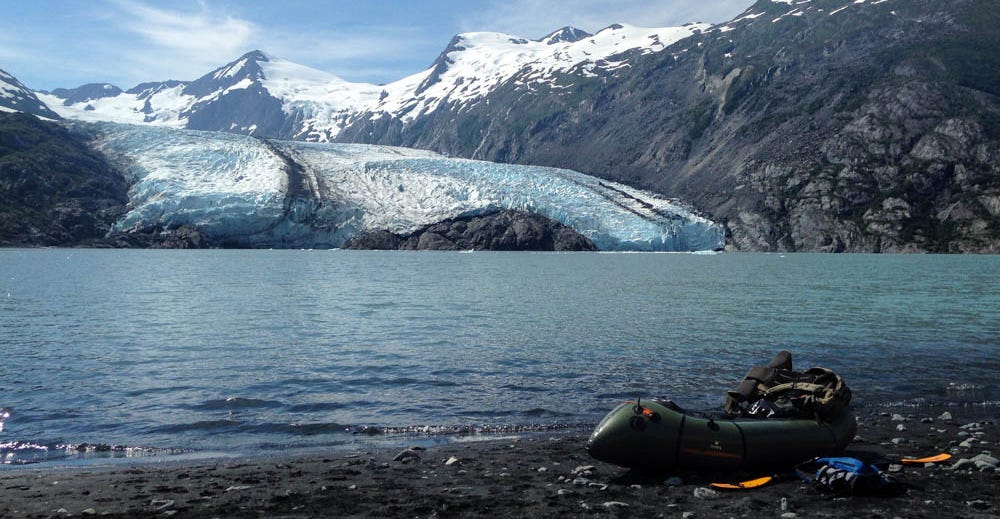Glacier Discovery by Packraft
Alaska 2016 - Part 7
…continued from The Richardson Highway
It was a sunny weekend in the Anchorage area, and I couldn’t pass up the chance to paddle the cold, charging rivers of Alaska, where the sport of packrafting was born. Just southeast of Anchorage, the Portage and Placer Rivers flow out of the Kenai Mountains to the mouth of the Turnagain Arm, making an easy scenic river trip for the local paddler. These rivers are both train supported, utilizing the Alaska Railroad’s Glacier Discovery line, which will take you within hiking distance of each river launch.
The beginning of each river is the end of a stunning lake, each with its own respective glaciers that carve out of the high mountains, creating a more dynamic lake-to-river boating experience. I wanted to do it all. Because Alaska. I packed my raft, camping gear, and a big box of Pop-Tarts for the weekend and boarded the train on Saturday morning.
Saturday: Spencer Lake and Placer River
9:45am – Depart from Anchorage
1:45pm – Get out at Spencer Whistle Stop, hike 1.3mi to Spencer Lake
2:30pm – Paddle Spencer Lake and Placer River 15mi to highway bridge
6:00pm – Hike 3mi to 20 Mile River and set up camp in the trees
Unlike the other train lines, Glacier Discovery is more specialized to assist in short day trips around the Spencer Glacer, Whittier, and Portage. The train got to the Spencer stop at midday and a group of us got out to raft downstream on commercial boats, kayak on the lake, or hike the trail system.

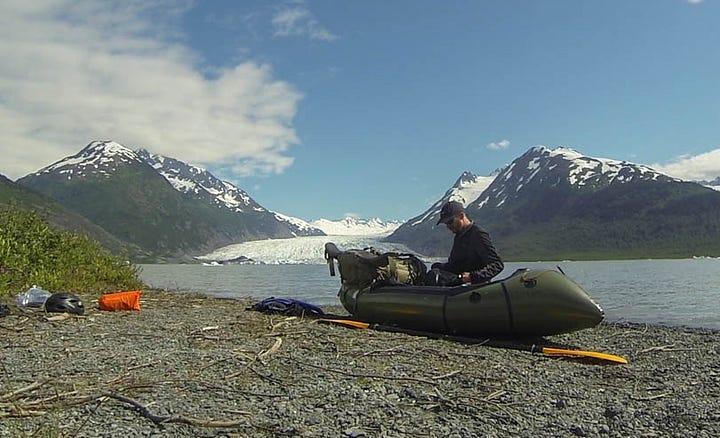
I hiked out to the edge of the lake, where at some point a glacier calving caused icebergs to float across and beach on the shore. The water was still on the calm day, reflecting the blue face of the Spencer Glacier from across the lake. I suited up and paddled out, maneuvering around several icebergs on the south edge. Soon, I found the river and went for the current. Up ahead, the roar of the rapids made my blood go cold.
It’s always the same. A new rapid is always a daring venture into the unknown to me. My fight against the currents in the river is just as real as the fight going on in my head. Can I get to the bottom of all of the chaos, overcoming the rapid and myself along with it? Will I crash into a mess of rocks and raging water, or will I clear the last standing wave like a rockstar? I don’t know. But I’m going for the throat, with my game face and bright eyes blazing. It will probably work.
I read that these rapids are a fast Class II, and I definitely agreed as I moved around several big rocks. It mostly channeled down the center, so the line was easy. Soon, my fear changed to a familiar afterglow of excitement and relief as I floated out to calming water. I got this. The Placer ain’t got nothing on me.
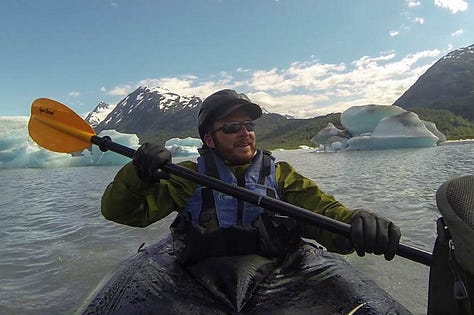
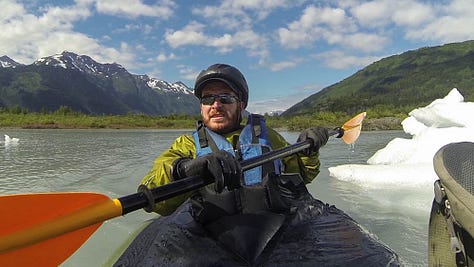
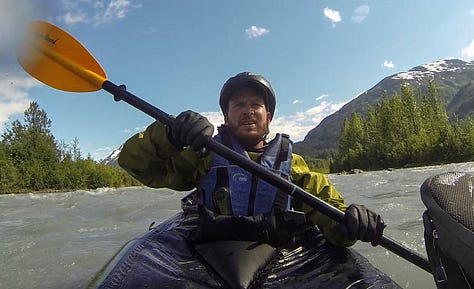
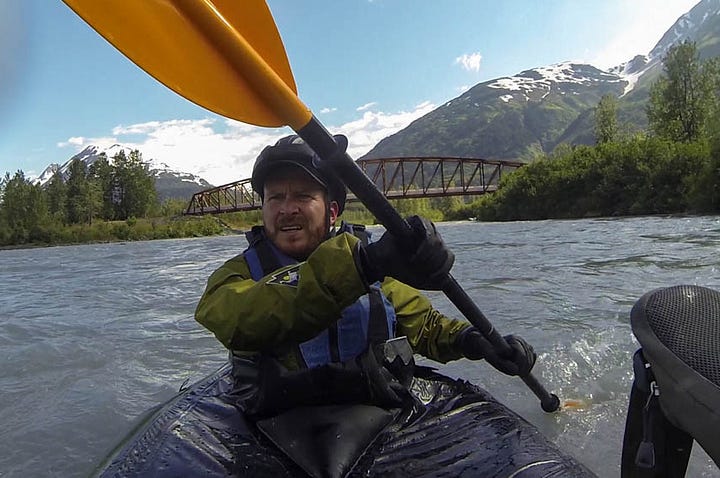

Up ahead, I saw numerous trees in the river. That’s not good. Wash up against a strainer in water like this and you’re in trouble. Once I got closer, the river started braiding into smaller channels. I realized that the trees were mostly beached on gravel bars, safely away from the water. I figured they would be, seeing as this river is commercially run. I wouldn’t be out here alone if it wasn’t.
For the next hour, I had fun navigating the fast braid system as the river charged its way out of the mountains. Eventually, I floated back into a wide channel, peacefully going out of the valley to the highway and the edge of the Turnagain Arm. I packed up and walked north towards the 20 Mile Bridge.
A few minutes later, somebody saw me walking and offered a ride. It was 3 women from Anchorage who also just got done packrafting the river.
“Hey, I think we saw you up there on the rapids.”
“Yeah?”
“Yeah, we put in right after them.”
“Sounds like you guys missed the party!” I wouldn’t blame them, though, especially if they were new to swiftwater. Those rapids looked a lot scarier when I scouted them than they turned out to be. If you work your way up to it erring on the side of caution, then you live to rock another day.
They dropped me off at Portage and got in their cars to go back to Anchorage. Ideally, Portage would be the place to park your car, get on the train, and get out at the top of the river. I set up camp in the trees and slept by the riverside of 20 Mile.
Sunday: Portage River
11:35pm – Get on train at Portage
12:05pm – Get out at Whittier and hike 4mi over Portage Pass
2:30pm – Paddle 3mi to end of Portage Lake
4:00pm – Paddle 8mi on Portage River to Highway
6:00pm – Hike 1mi to Portage Depot
7:20pm – Train to Anchorage
9:30pm – Steak
My Sunday trip was harder, not because of the river, but because of time. I had to traverse 16 miles in 7 hours – only a third of it by foot – to get back to Portage for their last 7:20 stop. I got to Whittier at noon and made a hard pace for the Portage Pass trailhead. From there, the trail was a steep 2 mile scuffle to the lake on the other side.
That lake, let me tell you, was awesome. It was walled in by steep mountains with the crystal blue husk of the Portage Glacier descending out of a snowfield on the far edge. If I wanted, I could have paddled a mile across for a closer look. I made for the river instead, trying to beat the clock.


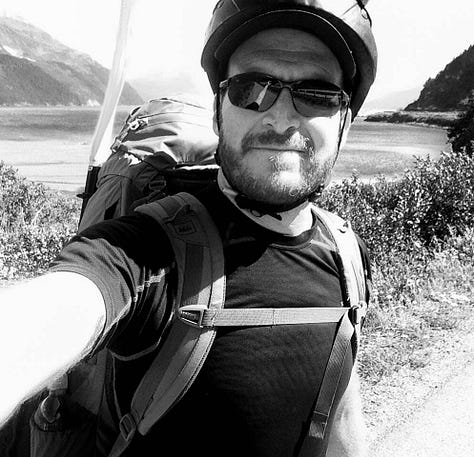
It was just over 3 miles to the end of the lake and the mouth of the Portage River. That lake was a test of my patience, with unpredictable ripples and wind slowing my progress. Without a current, everything is slow in a packraft. Nonetheless, the vista was amazing, with the giant Portage Glacier standing to my left. And to my right, the huge, steep wall of Mount Mayor towered above the shore. As I passed it, I counted 8 waterfalls cascading down its slopes, a few of them splattering onto the lake. I made it to the far end in the same time it takes to watch Terminator 2, got out, choked down another Pop-Tart, and got going 20 minutes ahead of schedule.
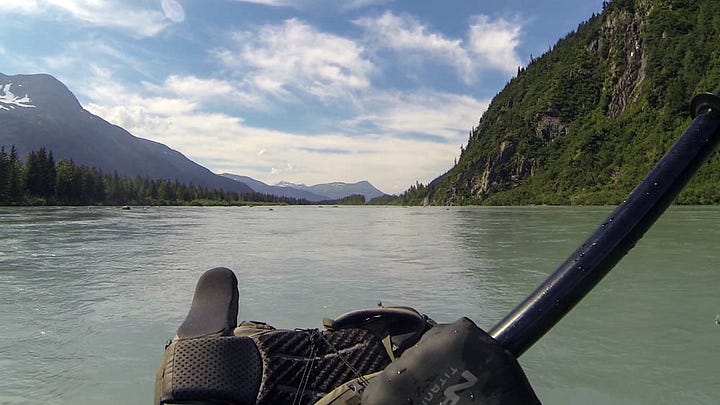

It was great to be back in a current again. The first couple miles were fast, easy Class I riffles, never getting worse than an occasional rock about 20 seconds away. It was definitely the easier of the two rivers, as the fast current flattened out about halfway through. Near the end, the river meandered out of the valley and into slow flatwater – what I like to call a Midwestern Bathtub. The good thing was by that point you’re pretty much done. I packed up at the highway bridge and got to the Portage Depot with 40 minutes to spare.
When the train came, the attendant got out and said “Hey, you made it!” I did, and I felt like a badass.
The Glacier Discovery train makes the shuttle support easy for packrafting – something the paddling scene up there already knows. I ran into 3 groups of people that weekend who were doing the same thing. If you don’t have a packraft, you can still sign up for a guided rafting trip down the Placer River when you buy your train ticket. All supported, all Alaskan.
Those were some great rivers, but I would have to say the highlight of my weekend was the T-bone steak I got at the diner next to my hotel. Only a hard weekend in the Alaskan country could have made it taste that awesome.
This story continues on The Shores of Kodiak Island.



